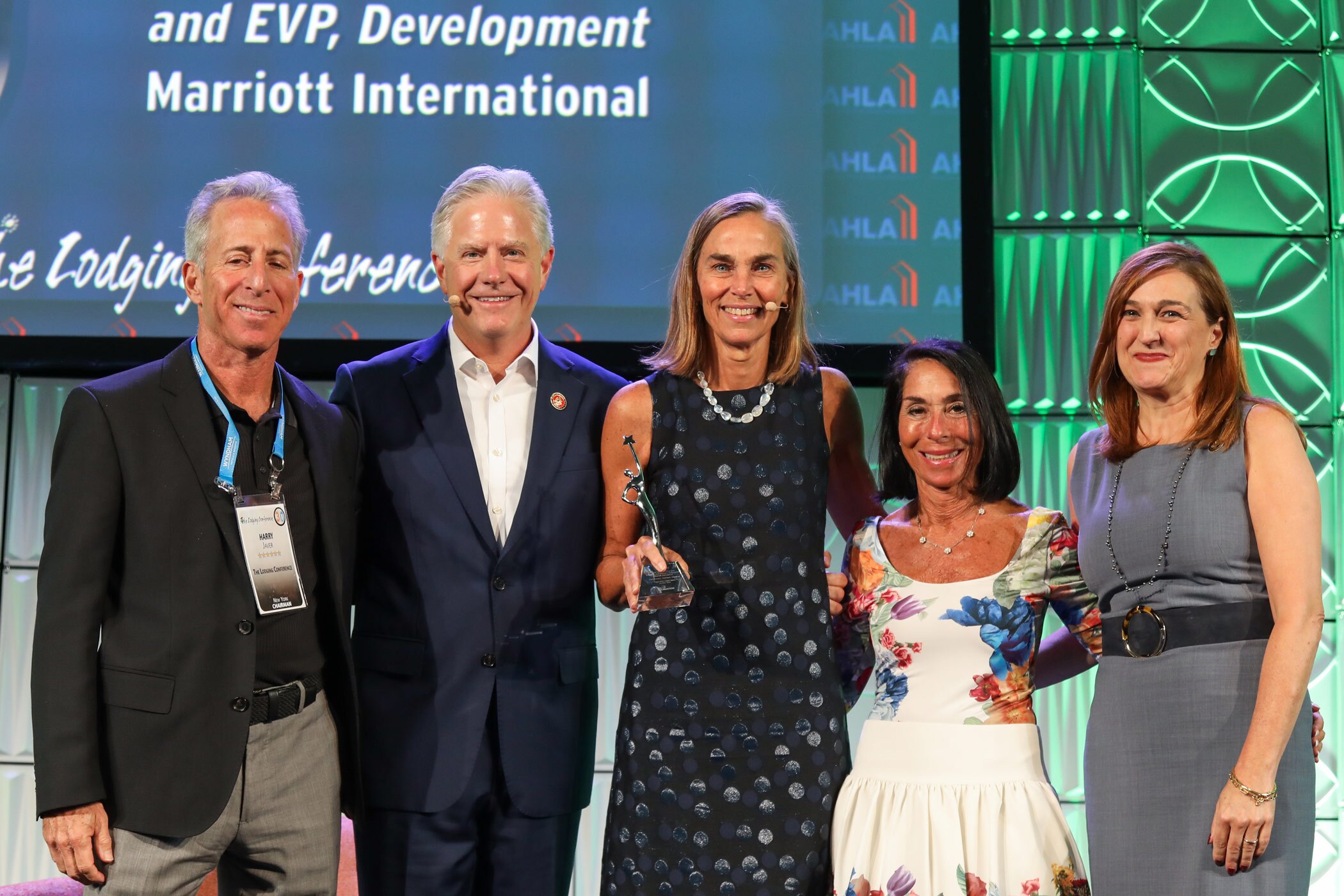PHOENIX — This year hasn't quite gone the way hoteliers expected, with performance coming short of expectations and the transaction market remaining relatively quiet as a couple of examples. With 2026 right around the corner, executives at The Lodging Conference hope that next year will bring better results as the industry wades through choppy waters.
There's been no shortage of uncertainty this year, as factors such as the U.S.'s tariff policy and rhetoric toward other countries having an impact on the hospitality industry could not have been planned for. This uncertainty certainly hasn't waned, but hoteliers are hopeful that their experience this year will have them primed for whatever comes next.
Photo of the day

Leeny Oberg (center), CFO and executive vice president of development for Marriott International, received this year's Peggy Berg Castell Award, which "honors leaders that have turned their success into ladders that others can climb," said Kevin Carey (second from left), AHLA chief operating officer and senior executive vice president in his remarks introducing the award. Oberg will retire from Marriott this March. Also pictured are The Lodging Conference's Harry Javer (left) and Elizabeth Wolff (second from right) and AHLA President and CEO Rosanna Maietta.
Quotes of the day
The U.S. government shutdown "has consequences for the lodging industry. In the last 24 to 36 hours, we've been hearing more stories about air traffic controllers. These are federal employees who are paid by the government — but not now. Air traffic controllers are calling in sick. And if this escalates with air traffic controllers and TSA employees, this is going to shut down travel. If the U.S. economy was a movie, this is when you would hear the iconic sounds of 'Jaws' music." —Bernard Baumohl, chief global economist at The Economic Outlook Group, speaking on the potential short-term threat to the U.S. travel industry that could happen as the current government shutdown persists.
"The longer hotels fester out there, there will be more pressure to transact. I think we’re reaching that inflection point. Based on conversations I've had leading up to here and at the conference, it does seem like we’ll start to see more activity." —Kate Henriksen, co-chief investment officer of RLJ Lodging Trust, in a panel discussion about hotel deal flow.
"I think the race here is not who adopts what first; I think the race here is going to be who standardizes this and adopts it first." — Kamalesh Patel, AAHOA chairman of 2025-2026, on improving hotel brand apps by adding more user-friendly tools.
Editors' takeaways
If the U.S. hotel industry is optimistic at the Americas Lodging Investment Summit in January and pessimistic at the NYU IHIF conference in June, the mood at The Lodging Conference in the fall is typically realistic.
This year, hotel executives speaking at the conference are honestly acknowledging that the uncertainty of the last 12 months is still there and having real impact on hotel valuations and budgeting. Lackluster performance, in the form of underwhelming average daily rate and revenue per available room growth, hasn't helped.
But the clouds are parting on hotel transactions, as brave buyers are confronting the bid-ask gap and making moves. Speakers this week talked about increased competitiveness for smaller hotels at lower price tags. These aren't trophy assets fetching record pricing, but making hotel deals at this level is the right move for this point in the cycle, especially with overall supply still so low, economists said.
"The tide is changing," said Rod Clough, president of the Americas at HVS. "We are going to be a more active deals market over the next 12 months. Maybe now is the time to sell your stabilized asset. There are plenty of buyers out there; there will be more buyers out there."
—Stephanie Ricca, editorial director
Will artificial intelligence be the piece of technology that finally breaks through for the hotel industry and catches it up to its peers? Hoteliers speaking at The Lodging Conference sure think so. Or at least hope.
Kamalesh Patel, AAHOA chairman of 2025-2026, echoed a sentiment that I've heard plenty of times reporting from hotel conferences: "Technology in hospitality today, for lack of better words, sucks. We are so, so far behind."
Perhaps a more blunt way of putting it than I've heard in the past, but alas it's a point that's been driven home many times.
We've been covering AI in the hotel industry for a few years now, so it's not like it's a brand-new tool at this point. Hoteliers preached soft-launching these tools to ensure its reliability, which was the correct idea in my estimation.
With the industry struggling with shrinking margins and seeking any possible relief, now feels like the time to lean on these tools to start producing results. Aimbridge CEO Craig Smith called the technology a "game-changer at many, many levels" and said it's already saving his company a lot of money with the budgeting process.
Maybe the cards are starting to fall into place for the industry to catch up.
—Trevor Simpson, associate editor
